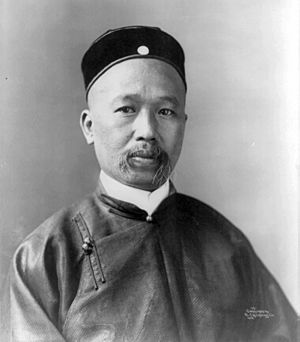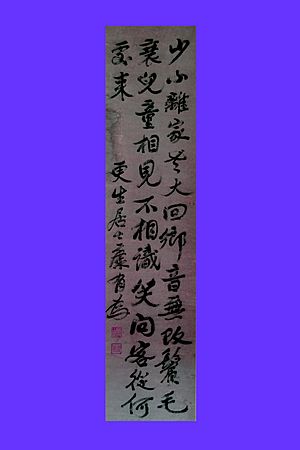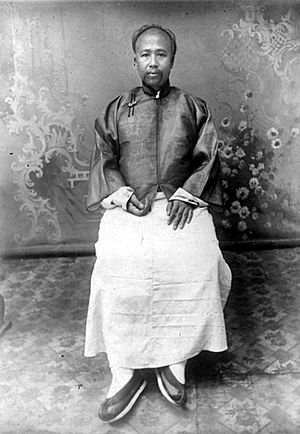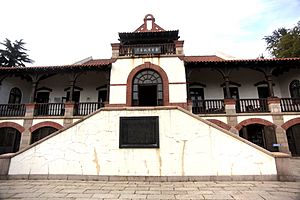Kang Youwei facts for kids
Quick facts for kids
Kang Youwei
|
|
|---|---|

Kang Youwei (c. 1905)
|
|
| Born | 19 March 1858 Nanhai, Guangdong, Qing dynasty, China
|
| Died | 31 March 1927 (aged 69) |
| Education | Jinshi degree in the Imperial Examination |
| Known for | Leader in the Gongche Shangshu movement Leader in the Hundred Days' Reform |
|
Notable work
|
Reformation of Meiji Emperor (日本明治變政考), and Reformation of Peter the Great (俄大彼得變政記) |
| Spouse(s) | Zhang Yunzhu Liang Xujiao He Zhanli 4th wife Liao Dingzhen Zhang Guang |
| Children | 15 children, including Kang Tongbi |
| Relatives | Kang Youpu (brother) |
- This is a Chinese name; the family name is Kang.
Kang Youwei (Chinese: 康有為; Cantonese: Hōng Yáuh-wàih; 19 March 1858 – 31 March 1927) was an important Chinese thinker and reformer. He lived during the late Qing dynasty, which was the last imperial dynasty of China. Kang Youwei was also a skilled calligrapher, which means he had beautiful handwriting.
He became close to the young Guangxu Emperor and encouraged him to make big changes. These ideas inspired a movement to reform China. However, his actions upset the powerful Empress Dowager Cixi, who was the emperor's adoptive mother. Kang Youwei later had to leave China because of his efforts to remove the Empress Dowager from power. Even after the Republic was formed, he continued to support the idea of a king or queen who shared power with a government elected by the people.
Contents
Early Life and Big Ideas
Kang Youwei was born on March 19, 1858, in Nanhai County, Guangdong province. From a young age, his family recognized his intelligence. They sent him to study classic Chinese texts to prepare for the civil service exams. These exams were very important for getting a job in the government.
However, as a teenager, Kang Youwei was not happy with the way people studied for these exams. He found the required writing style, called the "eight-legged essay," to be too artificial. To relax from his intense studies, he practiced Buddhist meditation. This was unusual for a scholar at that time.
During one of his meditations, he had a special vision. This vision became a main idea for his life's work. He believed it was possible to learn everything and "become a sage," which is a very wise person. He then decided to try and help all of humanity.
Kang's Vision for China
Kang Youwei believed that China needed to modernize, like Meiji Japan had done. He wanted China to become a constitutional monarchy. This meant having a ruler (like an emperor) whose power was limited by a constitution and laws. These ideas were very new and even angered some scholars who thought he was a heretic.
He also wrote about Confucius, an ancient Chinese philosopher. Kang argued that Confucius was a reformer, someone who wanted to change things for the better. This was different from how many people saw Confucius at the time.
The Hundred Days' Reform
Kang Youwei and his student, Liang Qichao, played a big part in a movement to modernize China. This movement is known as the Hundred Days' Reform. During this time, they tried to introduce many new ideas and changes to the Chinese government.
However, the powerful Empress Dowager Cixi ended these reforms. She even ordered Kang Youwei to be executed. But Kang managed to escape. He also started a group called the Protect the Emperor Society. This group claimed that the young emperor was being held against his will.
Kang Youwei traveled to many places where Chinese people lived outside of China. He said he was promoting the idea of a constitutional monarchy. But he was also trying to gain support and money for his own goals. He competed with another revolutionary leader, Sun Yat-sen, for followers.
He visited India twice to study it. He saw that India was controlled by another country because its different regions were not united. He thought this was a lesson for China.
Changes in China and Kang's Later Life
In 1912, the Xinhai Revolution led to the end of the Qing dynasty. China became a Republic under Sun Yat-sen. Even with this big change, Kang Youwei still believed in a constitutional monarchy.
In 1917, he tried to bring back the emperor in a failed attempt to take control of the government. A general named Zhang Xun and his soldiers took over Beijing. They announced that Emperor Puyi would rule again.
But this plan did not work out well. Most people in China were against having an emperor again. Kang Youwei became suspicious of General Zhang and feared he just wanted power for himself. Kang then fled to the American legation, which is like an embassy. The attempt to restore the emperor quickly failed.
Over time, how people viewed Kang Youwei changed a lot. At first, he was seen as a radical who wanted big changes. But later, he was seen as someone who was stuck in the past.
Kang's Vision for Society
Kang Youwei wanted to change the traditional Chinese family structure. He believed that the family system caused many problems. He hoped it could be ended.
Instead of families, he imagined state-run places like nurseries and schools to raise children. Marriage would be replaced by one-year agreements between a man and a woman. Kang thought that the way marriage worked then, where women were often trapped, was too unfair. He believed men and women should be equal and have the same opportunities.
Kang also thought that capitalism, an economic system based on private ownership, was bad. He believed the government should create socialist programs to take care of everyone. He even talked about "communism," though what he meant by this term is still debated. He was one of the first people in China to talk about Western ideas of communism.
He also imagined government-run homes for older people. Modern Chinese scholars often see Kang as an important supporter of Chinese socialism. His book, Da Tongshu, which describes his vision of a perfect world, is still popular. A publisher in Beijing even put it on a list of the 100 most important books in Chinese history.
Kang's Philosophical Views
Kang Youwei listed many things that cause human suffering. His ideas were similar to those found in Buddhism.
He said that some sufferings come from our physical lives, like being born, dying too soon, or losing a body part. Other sufferings come from natural disasters, such as famine from floods or droughts, or epidemics.
Sufferings also come from human relationships, like being a widow or an orphan. Being poor or having a low social status also caused suffering.
He also believed that society itself caused suffering. This included things like corporal punishment (physical punishment), imprisonment, taxes, and being forced to join the military. He even thought that the existence of the state (government) and the family caused suffering.
Certain human feelings, like stupidity, hatred, and too much desire, also caused suffering. Finally, things that people value highly, such as wealth, high positions, or being a ruler, could also lead to suffering.
Kang Youwei also thought about different religions. He believed that Christianity and Islam were at a lower level than Confucianism, Taoism, and Buddhism. He predicted that the "lower" religions would disappear in the future.
Death
Kang Youwei passed away at his home in Qingdao, Shandong, in 1927. He was 69 years old.
Images for kids
See also
 In Spanish: Kang Youwei para niños
In Spanish: Kang Youwei para niños
 | Delilah Pierce |
 | Gordon Parks |
 | Augusta Savage |
 | Charles Ethan Porter |






